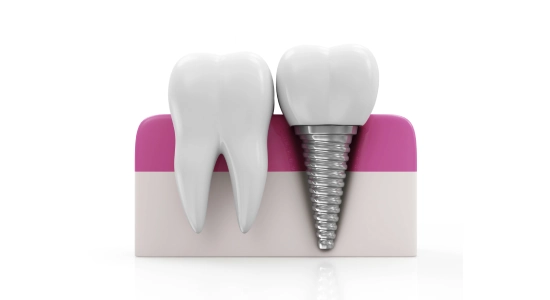Understanding “What is the success rate of dental implants?” is paramount for those considering this modern solution for tooth replacement. Dental implants have caused a revolution in the field of dentistry by offering a durable and natural-looking alternative to traditional dentures and bridges. Yet, how likely are these implants to succeed in the long term?
In this blog, we explore the complexities of dental implant success rates, examining the factors that impact their outcomes and providing insight into “What is the success rate of dental implants?”.

What leads to tooth loss and dental implant failure?
- Bacteria: It causes tooth decay and gum disease (periodontitis) in natural teeth. While dental implants aren't prone to decay, they can be affected by peri-implantitis, a gum disease.
- Stress: Stress can have various negative effects on dental health. Excessive force placed on teeth or dental implants due to stress can result in bone loss, tooth wear, or even the fracture of a dental implant.
What Is The Success Rate Of Dental Implants?
Dental implants act and feel just like healthy, natural teeth, allowing you to live life without any limitations. You can eat, smile, laugh, talk, kiss, and carry out everyday activities confidently without worrying about your teeth. So, what is the success rate of dental implants?
Unlike other dental solutions, dental implants do an excellent job of imitating the function and characteristics of natural teeth. Dentists often recommend them because they function almost the same as natural teeth. Studies show that the implant restoration process has a success rate of over 95%.
Furthermore, dental implants stand out for stimulating bone growth and preventing bone loss, which is crucial for maintaining dental health. Getting dental implants soon after losing a tooth helps stop bone loss at the site, which is important for long-term oral health.
Factors affecting the success rate of dental Implants
Infection
Quality of supporting bone
Your dental surgeon takes extra precautions to adjust your existing denture or temporary teeth to prevent micro-movement of your implant. Dietary restrictions are recommended to help prevent premature loading of your implant.
Smoking and Diabetes
For implants to heal quickly, the supporting bone must receive an adequate blood supply. Smoking can diminish the blood supply to the gums and supporting bone, slowing down the healing process and elevating the risk of implant failure.
Uncontrolled diabetes hampers proper healing and heightens susceptibility to infection, increasing the likelihood of implant failure.
Your dental surgeon may suggest you quit smoking before undergoing implant placement or ensure that your A1C level is below a certain threshold if you have diabetes before proceeding with implant surgery.
Maintaining Oral Hygiene
Maintaining proper oral hygiene is crucial when living with a dental implant. The implanted tooth/teeth can be cleaned just like natural teeth.
It’s essential to carefully clean the area under the implant restoration to remove any food particles and bacteria.
Food debris and bacteria around the implant restoration increase the risk of periodontal infection. Similar to how bacteria can cause bone loss around natural teeth, they can also cause bone loss around dental implants, known as peri-implantitis.
It’s imperative to uphold proper oral hygiene practices around both teeth and implants and to adhere to a regular checkup and dental cleaning schedule with your dentist every 3 to 6 months.
Surgical Technique:
Maintenance and Care to Enhance the Success Rate of Dental Implants
Dental implants offer a safe and effective solution for replacing missing teeth. However, like any dental procedure, certain factors influence the success rate of dental implants. Patient health is a key factor. Patients with good oral hygiene habits and regular oral checkups experience successful dental implants. Additionally, non-smoking patients with healthy gums tend to have better outcomes with dental implants.
The experience of the implant dentist is another critical factor. Dentists who have successfully placed numerous dental implants are more likely to ensure successful placement of your implant. It’s important to select a board-certified periodontist or oral surgeon to ensure proper Care during your procedure.
Furthermore, the type of implant chosen can impact the success rate. Titanium implants are the most common and boast a high success rate. However, zirconia implants have demonstrated comparable effectiveness to titanium implants.
Conclusion
What is the success rate of dental implants? There are several factors influencing the success rate of dental implants. While some, such as patients’ health and age, may be beyond our control, we can actively manage others with the assistance of a trained professional. We can improve our chances of successful implantation by attentively following each step in the implant process, including selecting an experienced dentist and adhering to their suggested maintenance routine. With proper care and vigilance, we can ensure that our investments in teeth replacements endure for many years to come.
Ready to explore the success rate of dental implants? Take the next step toward a radiant smile with All About Smiles in Canton, MI! Schedule your appointment online today. New patients call (734) 531-7638, and existing patients can reach us at (734) 981-1199. Your journey to optimal dental health begins here.







